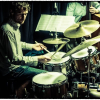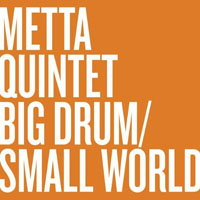Home » Jazz Articles » Big Band Caravan » Nova Jazz Orchestra / Christian McBride Big Band / NYJO
Nova Jazz Orchestra / Christian McBride Big Band / NYJO
 Nova Contemporary Jazz Orchestra
Nova Contemporary Jazz OrchestraWho Sez You Can't Dance to Bebop?
Nova Jazz
2010
When last heard from, Minnesota's dauntless Nova Jazz Orchestra was performing alongside the legendary

Stan Kenton
piano1911 - 1979
Albeit a small step or so removed talent-wise from the country's most celebrated big bands, Nova has come a long way since its first recording, In Walked Wendy, and Who Sez You Can't Dance to Bebop? is in many respects its most admirable effort to date, starting with alto saxophonist Kari Musil's engaging title song, a bop-tempered burner whose Latin subtext has "let's dance" written all over it. As is usually the case, what places Nova slightly behind its contemporaries are the soloists, most of whom are quite respectable but none of whom is likely to turn any heads or raise any eyebrows. Not a reproach, merely a fact. (Almost) everything else is above par, and the ensemble meshes well as a unit.
Speaking of bebop, there is one more bop-centered tune on the menu, alto Bob Byers' carefree "Chasin' the Dolphin" (down a well-known street known to be frequented by green-hued members of the species). "Dolphin" immediately precedes the boisterous finale, "Expecting Tom Boogie," a dynamic blues in the lower register with thunderous solos by baritones Mike Krikava and Paul Peterson, bass saxophonist Bill Burton and some boogie / stride piano by Bruce Pedalty. For a change of pace there are two ballads, and each is quite handsome: Peterson's "That's How I Know" (featuring trombonist Mike Larson) and Greg Stinson's "Ruya's Dream" (solos by flugel John Ahern, tenor Peterson, pianist Pedalty). That covers half the numbers. The others are Stinson's fast-moving, Mulliganesque "Expedition," Byers' rhythmically strong "To the Source," John Guari's lustrous "Meresque,"

Dan Cavanagh
composer / conductorb.1978
As noted, qualifiers such as "in many respects" and "almost" have been inserted when gauging the album's merit, and the reason for their use is lies in the quality of the recording itself, which is by and large unimpressive. The sound here has a pinched, almost monaural timbre, as opposed to the wide open stereo ambiance of most contemporary recordings, even those produced in a studio. As a result, separation among the sections is compromised, while soloists seem to be using the same microphone (which may have been the case). Once past that hindrance, however, there is much to weigh and appreciate, as Nova continues to gain ground in its steady rise toward parity with the best modern-day jazz orchestras.
 Christian McBride Big Band
Christian McBride Big BandThe Good Feeling
Mack Avenue
2012
All of a sudden, it seems, mature and well-known bassists are stepping out of the shadows, so to speak, to become leaders of their own big bands: first came septuagenarian

Ron Carter
bassb.1937

Christian McBride
bassb.1972

Wynton Marsalis
trumpetb.1961
What McBride produced for the LCJO was "Bluesin' in Alphabet City," one of eleven numbers on the band's debut album, The Good Feeling. It's a shuffling blues (with mere traces of

Nat Adderley
trumpet1931 - 2000

Melissa Walker
vocalsb.1964

Todd Bashore
saxophone, alto
Xavier Davis
pianoSpeaking of soloists, others who seize the moment are tenor

Ron Blake
saxophoneb.1965

Nicholas Payton
trumpetb.1973

Michael Dease
tromboneb.1982

Steve Wilson
saxophoneb.1961

Loren Schoenberg
saxophoneb.1958

Steve Davis
tromboneb.1967

Freddie Hendrix
trumpetb.1976
 NYJO
NYJOA Christmas Carol in Six Movements
Stanza Music
2012
While views of and approaches to various Christmas holiday traditions may vary widely from country to country and even town to town, one opinion seems to be near-unanimous—that Charles Dickens is the author of the most heartwarming and memorable seasonal novel ever written, namely A Christmas Carol. Ebenezer Scrooge, among the most unforgettable characters in all of literature, is the embodiment of unbridled avarice and unconditional redemption, transformed literally overnight from irredeemable misanthrope to lover of mankind by the spirits of Christmas past, present and future. Dickens depicted Scrooge's metamorphosis in transcendent prose, but could the spirit of his classic narrative possibly be captured and set to music? That was the question posed by

Bill Ashton
b.1936Pressed for time and writing feverishly, Hart drafted a six-part suite embracing the main themes of Dickens' novel, from Scrooge's brusque dismissal of the holiday sentiment ("Bah Humbug!") to his encounter with the anguished specter of his late partner ("The Ghost of Marley"), his harrowing liaisons with the spirits of Christmas past, present and future ("We Three Spooks"), his heart-wrenching memories of what might have been ("Long Forgotten"), his measured awareness of clerk Bob Cratchitt's crippled son ("Tiny Tim") and Tim's selfless invocation to everyone including his father's miserly overseer, Ebenezer Scrooge ("God Bless Us Everyone!"). Although the television program was canceled, Hart delivered the suite on time, and it was rehearsed and eventually recorded (in January 2010) at

Ronnie Scott
saxophone, tenor1927 - 1996
Thematic or not, this is absolutely marvelous big-band writing, superbly performed by NYJO's twenty-two member ensemble (plus vocalists Emma Smith and Kwabena Adjepong on "God Bless Us Everyone!"). "Bah Humbug!" is a straight-ahead burner in the finest big-band tradition with blistering solos by soprano saxophonist Lucas Dodd, flutist Helen Wilson and trumpeters Rob Greenwood and Tom Walsh. No humbug there, nor is there any on "The Ghost of Marley," set in a reggae form (Jacob Marley or

Bob Marley
guitar1945 - 1981

Jonathan Russell
violinb.1995
Ed Barker's shapely alto is showcased on the ballad "Long Forgotten," after which Wilson, Dodd and Shepherd return to undergird baritone Ben Mallinder, trumpeter Henry Armburg-Jennings and vibraphonist James Larter on the exuberant "Tiny Tim." Smith and Adjepong, whose voices are heard "instrumentally" throughout the suite, share the upbeat lyric on "God Bless Us," which is followed by a "bonus" track, Hart's "The Twelve Bars of Christmas," which appeared originally on NYJO's album A Merry Christmas and a Happy New Year in 1993. Different personnel, same result: almost ten minutes of superlative big-band jazz with brief but emphatic statements by (former) NYJO members Lisa Grahame and Howard McGill (alto), Adrian Revell and Scott Garland (tenor),

Julian Siegel
saxophone, tenor
Martin Shaw
trumpetb.1966

Jon Scott
drumsAs was the case with Hamelin, a second disc is part of the package; whereas with the former it was a DVD in which NYJO performed the suite at London's Royal Albert Hall, interspersed with readings from the text by Helen Ashton, A Christmas Carol is accompanied by a second CD in which each of the suite's six movements is preceded by a reading from Dickens' novel by actor James Smoker who's presently appearing the the London production of Les Miserables. Smoker is excellent, as is everyone else, especially the master composer / arranger Paul Hart, who has triumphed again. A Christmas Carol, as envisioned by Hart and performed by NYJO, is a boon for any season, and is recommended without pause.
 Two Bone Big Band
Two Bone Big BandHornplayers Fifty-Fifty
Mons
2012
Trombone-lover alert: Hornplayers Fifty-Fifty is a marvelous collaboration between tenor trombonist Ludwig Nuss and bass trombonist Ingo Luis (with rhythm) who, thanks to the science of overdubbing, have amplified their horns to comprise an entire section numbering as many as twenty trombones to make this truly a Two Bone Big Band. This is not the first album, nor even the second by the Luis / Nuss alliance, which debuted in 1988 with Horn Players Can't Eat Garlic and followed that up eleven years later with The Return of the Hornplayers. This latest endeavor honors their fiftieth birthdays (both were born December 12, 1961) and twenty-fifth year of making music together, which began at the Cologne Music College circa 1986, hence the title Hornplayers Fifty-Fifty.
Clever as the idea of a two-trombone big band may be, it wouldn't work unless the trombones in question were uncommonly talented. Happily, there is no unease in that area, as Nuss (a member of Germany's superb WDR Big Band) and Luis (employed by the WDR Radio Orchestra) are among the most virtuosic trombonists on the continent and beyond. Not only are they technically sound in every respect, they are brilliant soloists whose unescorted messages are consistently bright and engaging, as are those of pianist " data-original-title="" title="">Hubert Nuss, bassist

John Goldsby
bassb.1958
Joachim Schoenecker
guitarDid we mention they can also write? Luis' four compositions ("Samba de Mogan," "Low Motion," "Six-Pack," "Ithaca Stomp") are among the album's highlights, as is Nuss's "Needless to Say" (by far the "freest" among the dozen numbers). Luis arranged every number save "Needless to Say" and "Young and Foolish," which he co-arranged with Nuss and Mike Abene, respectively. Rounding out the program are the standards "You Make Me Feel So Young," "Someone to Watch Over Me" and "All of Me," the vocal group Take Six's "A Quiet Place" and a pair of German drinking songs, "3 Kolsche, bitte!" and the same "Extralarge," re-scored by Willy Ostermann.
For synchronized trombones at their charming best, it's hard to beat the sunny opener, "Samba de Mogan," even though the "band" comes close elsewhere, especially on "Low Motion" (showcasing Luis' low-register dexterity), "You Make Me Feel So Young," "Six-Pack," "3 Kolsche" and the fugue-like "Ithaca Stomp." Luis' sonorous bass trombone is front and center on "Someone to Watch Over Me" and "All of Me," silhouetted on the last against muted and open "sections" and a quasi-waltz that accentuate the song's inherent swing. Yet another in an unbroken series of highlights, followed in turn by the funky "Needless to Say" whose snappy bass solo is delivered courtesy of Goldsby. An album for those who love trombones in single, double or multiple array, or who simply appreciate well-played music no matter what instruments are in the forefront.
 UNI Jazz Band One
UNI Jazz Band OneLet Go
Self Published
2012
Let Go is the nineteenth album recorded over the past two decades by the University of Northern Iowa's Jazz Band One—the last nine under director Chris Merz—and the superb musicians keep on coming. While there is no way to envision how many of these talented young students may pursue careers as professional musicians, the fact is that they could change the group's name from Jazz Band One to Pro Band Whatever and almost no one would notice the difference. Yes, they are that good, right up there with North Texas, Miami, Wisconsin-Eau Claire, Northern Illinois, Cincinnati, North Florida, Northern Colorado and other notable university-level ensembles.
The program consists of nine original compositions, four of which were recorded in concert, the others in UNI's Jazz Studio. The band nails every one of them, astutely mastering every nuance and swinging with abandon whenever Merz loosens the reins and digs in the spurs, as he does on

Joe Henderson
saxophone1937 - 2001

Mary Lou Williams
piano1910 - 1981

David Berkman
piano
Kenny Wheeler
flugelhorn1930 - 2014

Rick Hirsch
composer / conductorb.1970
Besides performing admirably as a unit, Jazz Band One has a number of splendid soloists, one of the more engaging of which is pianist Jon Snell who solos on "Incident" and "Could've Been." Noah Alvarado is featured on flugelhorn ("Foxy Trot") and trumpet ("Let Go"), while Robert Espe shows his versatility by soloing on clarinet ("Camel Hop"), soprano sax ("Could've Been") and tenor ("Hindsight, " "Incident"). Others heard to good advantage are altos Gabe Scheid and Sam Petersen, trombonist Mike Conrad and drummer Cory Healey ("Tetragon"), Petersen (soprano ) and guitarist Eric Atchison ("City in the Window"), trombonist Jon Mallak ("Incident"), Alvarado (trumpet) and Schroeder ("Camel Hop"). For those who may wish to know, "City in the Window," "Camel Hop," "Simple Pleasures" and "Let Go" were recorded in front of an audience.
Let Go is clearly another triumph for UNI's impressive Jazz Band One, much of the credit for which must go to Merz who has kept the Jazz Studies program on an upward course since he replaced its founder, " data-original-title="" title="">Bob Washut, nearly a decade ago. If the past is a reliable measuring stick, another exemplary album by the UNI Jazz Band One should be available in another year or so.
Tracks and Personnel
Who Sez You Can't Dance to Bebop?
Tracks: Who Sez You Can't Dance to Bebop? (Bailas Bebop?); Expedition; That's How I Know; To the Source; Meresque; Having Built in Deeper Water; The Reincarnation of Queen Irene; Ruya's Dream; Chasin' the Dolphin; Expecting Tom Boogie.
Personnel: John Ahern: artistic director, lead trumpet; Mike Krikava, leader, baritone sax, bass clarinet; Tim Martin: trumpet; Sten A. Johnson: trumpet; Graham Martin: trumpet; Bob Byers: alto, soprano sax, flute; Kari Musil: alto sax, flute, clarinet; Bill Burton: tenor, bass sax, clarinet; Paul Peterson, tenor, baritone sax, flute, clarinet; Mike Larson: trombone; Chris Wiley: trombone; Craig Lawless: trombone; Ike Wagner: bass trombone; Bruce Pedalty: piano; John Hyvarinen: guitar; Pete Karstad: bass; Dave Perry: drums. Special guests—Sten M. Johnson: tenor sax solo (1); Michelle Kinney: cello solo (7).
The Good Feeling
Tracks: Shake 'n Blake; Broadway; Brother Mister; When I Fall in Love; Science Fiction; The Shade of the Cedar Tree; The More I See You; I Should Care; A Taste of Honey; Bluesin' in Alphabet City; In a Hurry.
Personnel: Christian McBride: leader, conductor, arranger, bass; Frank Greene: trumpet; Freddie Hendrix: trumpet; Nicholas Payton: trumpet; Nabate Isles: trumpet; Steve Wilson: alto sax, flute; Todd Bashore: alto sax, flute; Ron Blake: tenor, soprano sax, flute; Todd Williams: tenor sax, flute; Loren Schoenberg: tenor sax (2, 8); Carl Maraghi: baritone sax, bass clarinet; Steve Davis: trombone; Michael Daase: trombone; James Burton: trombone; Douglas Purviance: bass trombone; Xavier Davis: piano; Ulysses Owens Jr.: drums; Melissa Walker: vocals.
A Christmas Carol
Tracks: Bah Humbug!; Ghost of Marley; We Three Spooks; Long Forgotten; Tiny Tim; God Bless Us, Everyone!; The Twelve Bars of Christmas (bonus track).
Personnel: Paul Hart: composer, arranger, music director. A Christmas Carol—Mark Armstrong: NYJO music director; James Smoker: narrator; Rob Greenwood: trumpet; Tom Walsh: trumpet; Henry Armburg-Jennings: trumpet; Reuben Fowler: trumpet; Mark Perry: trumpet; Lucas Dodd: alto, soprano sax; Ed Barker: alto sax; Richard Shepherd: tenor, soprano sax; Tom Stone: tenor sax; Ben Mallinder: baritone sax; Helen Wilson: flute; Anna Drysdale: French horn; Calum Au: trombone; Robbie Harvey: trombone; Ross Anderson: trombone; Mathew Walton: trombone; Ross Brennan: trombone; Chris Eldred: piano; Jonathan Russell: guitar; James Larter: vibes, percussion; Sandy Suchadalski: bass; Scott Chapman: drums; Emma Smith, Kwabena Adjepong: vocals. The Twelve Bars of Christmas—Bill Ashton: NYJO music director; Martin Shaw: trumpet; Ian Wood: trumpet; Mark Cumberland: trumpet; Jim Lynch: trumpet; Jon Scott: trumpet; Olly Preece: trumpet; Lisa Grahame: alto sax; Howard McGill: alto sax; Adrian Revell: tenor sax; Scott Garland: tenor sax; Julian Siegel: baritone sax; Vicky Freestone: flute; Clare Lintott: French horn; Pat Hartley: trombone; Brian Archer: trombone; Malcolm Smith: trombone; Tracey Holloway: trombone; Colin Philpott: trombone; Steve Hill: piano; Andy Jones: guitar; Mark Ong: bass; Chris Dagley: drums; James Mack: percussion.
Hornplayers Fifty-Fifty
Tracks: Samba de Mogan; Low Motion; Young and Foolish; You Make Me Feel So Young; The Lost Six-Pack; Someone to Watch Over Me; Ithaca Stomp; All of Me; Needless to Say; 3 Kolsche, bitte!; A Quiet Place; 3 Kolsche, bitte!—extra large.
Personnel: Ludwig Nuss: trombone; Ingo Luis: bass trombone; Hubert Nuss: piano; John Goldsby: bass; Hans Dekker: drums; Joachim Schoenecker: guitar (5, 8).
Let Go
Tracks: Tetragon; Foxy Trot; City in the Window; Incident @ Perkins; Simple Pleasures; Could've Been; Hindsight Foresight; Let Go.
Personnel: Chris Merz: director; Aaron Askam: trumpet; Noah Alvarado: trumpet; Logan Vander Weil: trumpet; Antonio Garza: trumpet; Erin Maltby: trumpet; Sam Peterson, Gabe Scheid, Robert Espe, Nolan Schroeder, Andy Heard: reeds; Mike Conrad: trombone (1); Jon Mallak: trombone; Zac Cornell: trombone; Spencer Walrath: trombone (2-9); Zach Gignac: bass trombone; Austin Brown: guitar (1, 2, 7-9); Eric Atchison: guitar (2-5); Jon Snell: piano; Brooke Peters: bass; Cory Healey: drums, vibes (5); Jeff Oatts: drums (5). Special guest—David Berkman: piano (6).
Tags
Big Band Caravan
Jack Bowers
United States
Stan Kenton
Dan Cavanagh
Ron Carter
Christian McBride
wynton marsalis
Nat Adderley
Melissa Walker
Todd Bashore
Xavier Davis
Ron Blake
Nicholas Payton
Michael Dease
Steve Wilson
Loren Schoenberg
Steve Davis
Freddie Hendrix
Bill Ashton
Ronnie Scott
bob marley
Jon Russell
Julian Siegel
Martin Shaw
Jon Scott
Hubert Nuss
John Goldsby
Joachim Schoenecker
Take Six
Joe Henderson
Mary Lou Williams
David Berkman
Kenny Wheeler
Rick Hirsch
Bob Washut
Comments
PREVIOUS / NEXT
Support All About Jazz
 All About Jazz has been a pillar of jazz since 1995, championing it as an art form and, more importantly, supporting the musicians who make it. Our enduring commitment has made "AAJ" one of the most culturally important websites of its kind, read by hundreds of thousands of fans, musicians and industry figures every month.
All About Jazz has been a pillar of jazz since 1995, championing it as an art form and, more importantly, supporting the musicians who make it. Our enduring commitment has made "AAJ" one of the most culturally important websites of its kind, read by hundreds of thousands of fans, musicians and industry figures every month.





 Buy Now
Buy Now

















